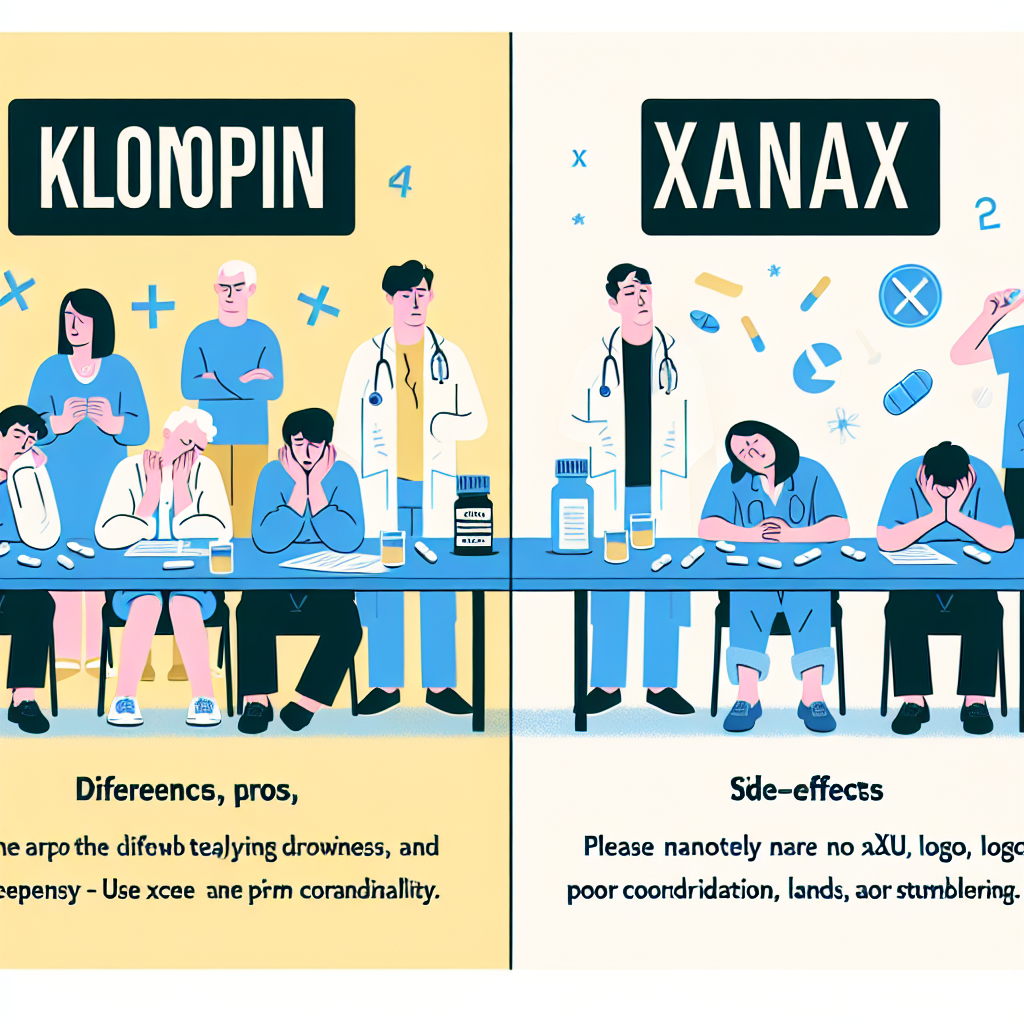When comparing treatment options for panic, acute anxiety, or insomnia, the conversation often centers on benzodiazepines — in particular, klonopin vs xanax as two commonly prescribed choices. Both medications belong to the same drug class but differ in how quickly they act, how long they last, their typical uses, and their risk profiles. This guide walks through the clinical differences, pros and cons, and practical considerations so you can discuss options more informedly with a prescriber.
Klonopin versus Xanax: how they work and why it matters
Klonopin (generic name clonazepam) and Xanax (generic name alprazolam) are benzodiazepines that enhance the calming neurotransmitter GABA in the brain. Clinicians sometimes frame the discussion as clonazepam vs alprazolam because those are the active ingredients most doctors see in electronic records. A key clinical distinction is pharmacokinetics: alprazolam has a faster onset and shorter duration, whereas clonazepam has a longer half-life and tends to provide steadier levels over time.
Onset, duration, and typical uses
Alprazolam’s rapid onset makes it useful for sudden panic attacks, while clonazepam’s longer action is often favored for ongoing anxiety management or as an adjunct for certain seizure disorders. Understanding the difference between klonopin and xanax helps explain why one may be chosen over the other depending on whether immediate relief or sustained control is the goal.
Side effects, dependence risk, and safety
Both drugs carry risks of drowsiness, dizziness, impaired coordination, memory issues, and the potential for tolerance and dependence with long-term use. Questions like clonazepam vs alprazolam which is stronger or is klonopin stronger than xanax are common; true “strength” depends on dose, receptor affinity, and clinical purpose rather than a simple one-to-one ranking. In practice, alprazolam’s shorter action can lead to more frequent dosing and withdrawal symptoms between doses, which may increase dependence risk for some people.
Interactions and special populations
Benzodiazepines interact with alcohol, opioids, and certain other sedatives in ways that can depress breathing and increase overdose risk. Older adults are more sensitive to cognitive and motor side effects. Pregnant people should discuss risks and alternatives with their clinician. For evidence-based context on anxiety disorders and treatment options, see the NIMH overview of anxiety disorders.
Practical comparisons and common questions
When patients weigh options they often ask plain-language questions. Is klonopin better than xanax? Is klonopin stronger than xanax? Answers are individualized: some people tolerate clonazepam’s steady profile better for chronic anxiety, while others need alprazolam’s fast relief for discrete panic episodes. For medication identification questions like is teva 833 like xanax, remember that pill imprints can indicate a generic manufacturer or dosage of alprazolam, but matching appearance doesn’t replace professional guidance on equivalence or dosing.
- Onset: alprazolam typically acts faster than clonazepam.
- Duration: clonazepam generally lasts longer and may require less frequent dosing.
- Use cases: alprazolam often for acute panic; clonazepam for longer-term anxiety control or seizure adjuncts.
- Dependence: both have dependence potential; withdrawal profiles differ.
Clonazepam vs xanax in specific contexts
For clinicians and patients comparing clonazepam vs xanax or considering clonazepam vs alprazolam which is stronger, it’s helpful to focus on treatment goals, frequency of symptoms, prior medication responses, and risk factors for misuse. Another question — which is better for sleep clonazepam or alprazolam — depends on whether the sleep issue is transient insomnia tied to acute anxiety (where a fast-acting agent might help) versus a chronic sleep disorder (where nightly long-acting agents increase morning sedation risk).
If you’re exploring non-prescription strategies or wondering about alternatives to short-acting benzodiazepines, see more detailed consumer-facing guidance on over-the-counter substitutions and safety considerations in information on over-the-counter Xanax alternatives.
Making a safe decision
Choosing between these medications should always be a shared decision with a prescriber who knows your medical history, other medications, and substance use risk factors. Tapering and discontinuation plans are important to reduce withdrawal risk if you stop benzodiazepines. Non-benzodiazepine approaches — cognitive behavioral therapy, selective serotonin reuptake inhibitors (SSRIs), lifestyle strategies, and sleep hygiene — are effective alternatives or complements for many people.
FAQ
Are clonazepam and alprazolam interchangeable?
Not exactly. They both belong to benzodiazepines but differ in onset and duration. A prescriber may switch between them for clinical reasons, but doses and monitoring will change.
Which is better for long-term anxiety control, clonazepam vs alprazolam?
Clonazepam’s longer half-life can make it a more stable option for longer-term control, but long-term benzodiazepine use has risks and alternative treatments are often preferred for chronic anxiety.
How should I approach concerns about dependence?
Discuss risks with your provider, use the lowest effective dose for the shortest possible time, and plan any discontinuation as a gradual taper supervised by a clinician to minimize withdrawal.






